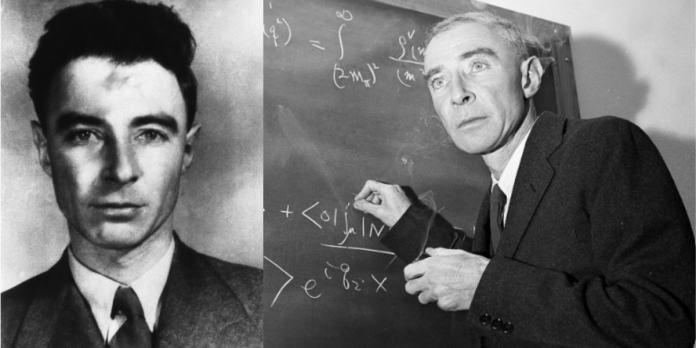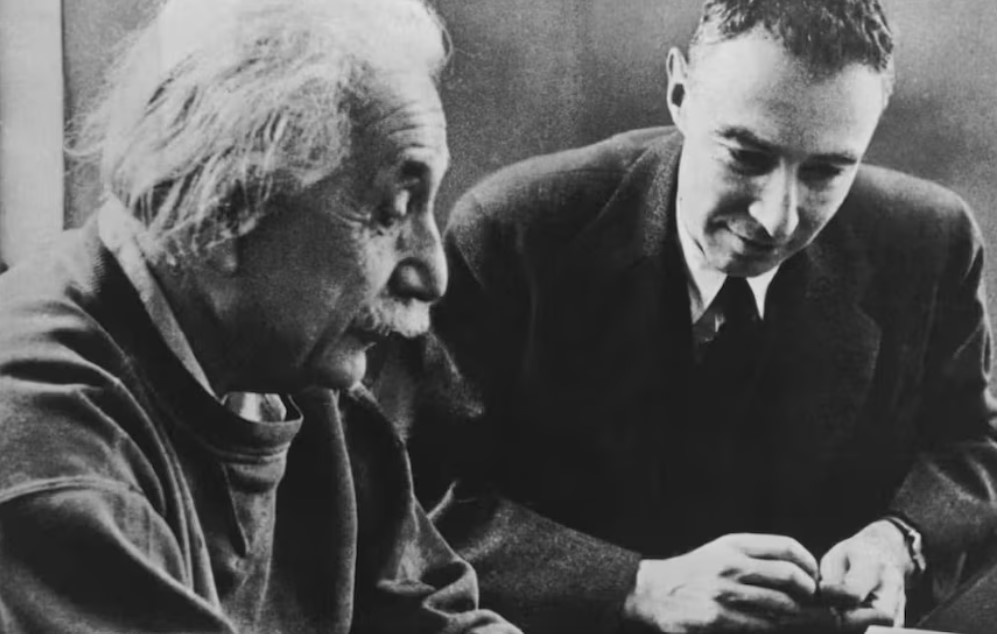
‘Now I am become Death, The Destroyer of Worlds’: The True Story Of Robert Oppenheimer The Father Of The Atomic Bomb.
Date:

Share post:
Audiences’ Curiosity Ignited
The release of Christopher Nolan’s latest epic, Oppenheimer, has left audiences pondering the authenticity of the story it portrays. The film delves into the life of American theoretical physicist J. Robert Oppenheimer and his pivotal role in inventing the atomic bomb, exploring the profound consequences of this deadly weapon.
Separating Fact from Fiction
As viewers immerse themselves in the gripping narrative, they question the movie’s accuracy and the real events it depicts. Let’s uncover the true story behind Oppenheimer and delve into the life of this extraordinary physicist.
The Renowned J. Robert Oppenheimer
J. Robert Oppenheimer stood as one of the United States’ most esteemed theoretical physicists during the 1920s and 1930s. As skillfully portrayed in the film, he led the Manhattan Project laboratory in Los Alamos, New Mexico, after being secretly recruited by President Franklin D. Roosevelt. Kai Bird, co-author of “American Prometheus: The Triumph and Tragedy of J. Robert Oppenheimer,” the basis for the film, credits Oppenheimer as the “father of the atomic bomb.”
The Monumental Trinity Test
July 16, 1945, marked a momentous day when Oppenheimer and his accomplished team conducted the world’s first atomic bomb test in the desolate Jornada del Muerto desert in New Mexico. Dubbed “Trinity,” this detonation unleashed a force equivalent to 21 kilotonnes of TNT, with the shockwave felt over 160km (100 miles) away. However, this groundbreaking achievement took a toll on Oppenheimer’s health, leading to a drastic weight loss to just 115 pounds.
Confronting Regret and Ethical Dilemmas
Throughout his life, Oppenheimer seemed haunted by his involvement in creating the atomic bomb, as later interviews revealed his sense of remorse. He became famous for uttering the profound phrase, “I am become Death, the shatterer of worlds,” upon witnessing the first test. This quote from the Hindu scripture Bhagavad Gita shaped his philosophical outlook, as documented by the Berkeley Historical Plaque Project.
Interestingly, Oppenheimer’s guilt was not without complexities, as he disavowed any responsibility for the 1945 atomic bombings of Hiroshima and Nagasaki during World War II. He stated that the use made of the atomic bomb was a problem for governments, not scientists, absolving himself of any moral burden, as reported by The New York Times.
A Fateful Meeting with Truman
The movie depicts Oppenheimer meeting President Harry S. Truman, who ordered the bombings of Japan. The encounter, however, was less than successful, with Oppenheimer expressing remorse to Truman. Bird reveals that the meeting was disastrous, and Truman allegedly referred to Oppenheimer as a “crybaby scientist.”
Exploring Oppenheimer’s Personal Life
Beyond his scientific achievements, Oppenheimer’s personal life was filled with intriguing complexities. During his tenure as a lecturer at the University of California, Berkeley, from 1929 to 1943, he gained popularity among students, earning the nickname “Oppie.” He was known for his striking looks, bohemian attitudes, leftist politics, and eclectic tastes.
Oppenheimer’s romantic life was equally captivating. He married Katherine “Kitty” Puening, portrayed by Emily Blunt in the film, after an affair, and they had two children. Kitty worked as a laboratory technician in Los Alamos, studying the effects of radiation on human beings. However, Kitty’s past association with the Communist Party would later impact her husband’s career.
Also Read: Anoushka Jolly’s Anti-Bullying Movement, Empowering Youth Against Bullying

First Love and Tragedy
Despite his marriage, Oppenheimer’s love for Jean Tatlock, portrayed by Florence Pugh, endured throughout his life. They met during Oppenheimer’s time at Berkeley, and despite a significant age difference, they were deeply in love. Oppenheimer allegedly proposed to Tatlock twice, and their affair continued even after his marriage to Kitty. Tragically, Tatlock’s affiliation with the Communist Party proved devastating for Oppenheimer’s career. She died by suicide at the young age of 29 on January 4, 1944.
A Troubled Childhood
Oppenheimer’s early life was not without challenges. Born on April 22, 1904, into a Jewish family in New York City, he excelled academically and graduated as valedictorian in 1921. However, health issues, including a near-fatal case of dysentery, delayed his enrollment at Harvard until September 1922.
Studying physics at the Cavendish Laboratory in Cambridge in 1925, Oppenheimer struggled with depression. He expressed his frustration in a letter to a friend, describing the lab work as tedious and unfulfilling, with vile lectures.
The Poisoned Apple Incident
A notable event during his time in Cambridge was the “poisoned apple” incident, portrayed in the movie. Consumed by feelings of inadequacy and intense jealousy, Oppenheimer tampered with his tutor Patrick Blackett’s apple, adding chemicals from the laboratory. Authorities discovered this before Blackett could eat the apple, almost leading to Oppenheimer’s expulsion from the university.

The McCarthy Era and Its Impact
Life took a dramatic turn for Oppenheimer during the McCarthy era when he faced accusations of being a Communist Party sympathizer due to his political views and relationships. His outspoken warnings about the dangers of nuclear warfare contributed to the scrutiny he faced, as his opinions were politically unpopular. In 1954, he was brought before the Atomic Energy Commission and lost his security clearance. The FBI also bugged his home during his tenure at Berkeley. Although Oppenheimer was never an official Communist Party member, his brother and a close friend were, which further fueled suspicions about his affiliations.
Struggling with Beliefs and Legacy
Following the hearing, Oppenheimer grappled with reconciling his beliefs and the implications of his scientific contributions. He remained critical of authority and arrogance, leading to powerful political enemies. Oppenheimer battled throat cancer, likely exacerbated by chain smoking, and passed away on February 18, 1967, in Princeton, New Jersey, at the age of 62.
Decades later, Oppenheimer’s impact on the world continues to resonate, leaving an enduring legacy that sparks curiosity and introspection.
Also Read: Bal Puraskar Winners, Youthful Visionaries, Celebrating Brilliance Young Changemakers
